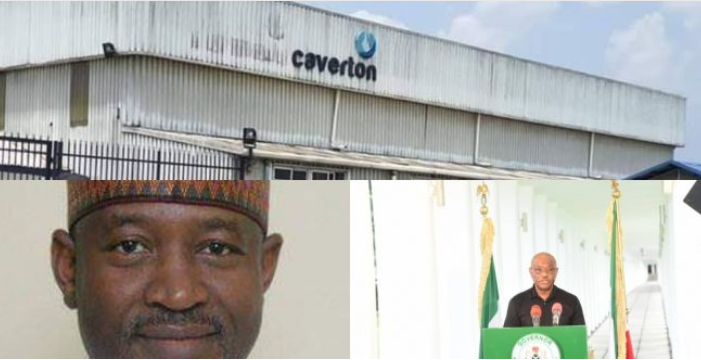Governor Wike declared a lockdown in Rivers State as did other states.
Yesterday one Calverton helicopter brought in 10 persons into the city
Port Harcourt in direct disregard for the health of the people of Rivers
State. The Governor ordered for the arrest of the ferried workers and
the two pilots that flew them in. They have been charged to court and
are currently held in custody, awaiting trial.
This morning the Minister of Aviation announced on television that he,
the Minister, authorized the flight. He argued that because Aviation is
exclusively under the purview of the federal government, the Governor
has no power to stop them from breaching the lockdown order, talk less
arrest them. He cited national security interest. Specifically he stated
that due to the fall in oil price the federal government needed to keep
the oil industry revenue flowing.
I find the Minister of Aviation’s argument nauseating but not
surprising given how reckless the Nigerian government sees Rivers State,
the region that sustains the economy of Nigeria.
The Minister needs to understand that for obvious reasons, the President
of the Federal Republic of Nigeria has less inherent authority to
respond to pandemics than governors. In order words, the Governor of a
state and his people are closer to each other and are at the receiving
end of the pandemics.
The Federal Republic of Nigeria’s constitutional powers arise as
enumerated powers—it has only the powers granted it by the
Constitution. The Constitution of the Federal Republic of Nigeria 1999,
schedule 2, parts I and II enumerate the powers expressly reserved to
the federal government. Although“Quarantine” is one of the
Enumerated Powers, see Constitution of the Federal Republic of Nigeria
1999, schedule 2, part I, paragraph 54; “Quarantine” has been used
only once in Nigeria’s history, never since independence, and arises
from the 1926 Quarantine Act to authorize or require port health
officers to take a host of measures to prevent the importation into and
spread of infectious diseases within Nigeria.
“Quarantine” as referenced in the laws of Nigeria and the
Constitution of the Federal Republic of Nigeria 1999, schedule 2, part
I, paragraph 54 are inapplicable to the current dispute regarding the
powers of H.E. Governor Wike to issue orders to protect the health and
safety of the citizens of Rivers State. That power arises from what is
known as the “Residual Powers List”, which though not expressly
provided for in the Constitution, captures the residue, that is, all
that is not specified in the Exclusive and Concurrent Lists. The
Nigerian state governments have absolute authority to legislate on those
issue. See _AG Abia State v AG Federation_ (2006) 16 NWLR (Part 1005)
265 at 380-381, paras. D-C, per Ngwuta JSC.
Significantly, the Nigerian Supreme Court held that unlike State orders
or laws involving matters of concurrent or exclusive jurisdiction where
the State legislative or executive action cannot run counter to the
federal action, the doctrine of covering the field does not apply to
state action in residual matters. _AGF v. AG Lagos_, Suit No. SC
340/2010 [2013], 16 NWLR (Part 1380) 249.
The states, by contrast, possess a general police power—an _inherent_
authority that is then limited by both the state and federal
Constitution. A governor or state legislature can often act without a
specific grant of power. The power to act is presumed, absent a specific
limitation. That is the essence of a federal system.
The United States has a more well-defined and historically robust
federal system than does Nigeria. However, Nigeria is still a federal
Republic and the centralization of power is not unchecked. Just as it
would horrify many in Aso Rock if it were determined that religious
observations and customs -including Sharia Law, for instance were banned
because the federal government has exclusive constitutional authority in
that sphere, so should the federal government stand down in this
Calverton Helicopter Incident. In 1824, the U.S. Supreme Court observed
in _Gibbons v. Ogden_ that sovereign state authority includes the
authority to enact “quarantine laws” and “health laws of every
description.”
It may be useful to address the question thusly: just as Nigeria’s
president and the federal government in general are acting at the peak
of their powers during times of war when national security is
threatened, Nigeria’s governors are often at the peak of _their_ power
when public health is at stake.
Rivers State is “at War” with COVID-19. H.E. Chief Nyesom Wike is
entrusted with the health and well-being of the citizens of Rivers State
and he has the power to impose a lockdown and arrest or thwart anyone
that threatens Rivers State during this health crisis – even if that
threat is employed by or excused by the federal government. The
COVID-19 virus does not know the difference, and neither must Chief Wike
if he is to win this War against COVID-19 and the real threat of a
pandemic that could kill hundreds of thousands of Rivers’ people.
Clearly, Governor Wike’s lockdown is not a regulation of aviation or
the oil industry but an evenhandedly applied health and safety response
to the pandemic, just as the lockdown’s prevention of political
rallies or attendance at football matches are not regulations of free
speech and association or sport. The incidental effects of a lockdown
cannot invalidate its compelling and urgent legitimate objective.
Otherwise, government would be helpless in fighting pandemics that
threaten all. No constitution should be interpreted to make it a
suicide pact.
The federal government and the Ministry of Aviation cannot want to
improve oil revenue at the expense of the health and well-being of the
citizens of Rivers State. The Minister has taken the joke too far. He
wants to kill Rivers people simply because he needs oil revenue. The
Minister should listen to himself again.
*Lloyd F. UKWU, a lawyer writes from Port Harcourt
and
*Bruce DELVALLE, a constitutional law expert writes from Washington DC,
USA



